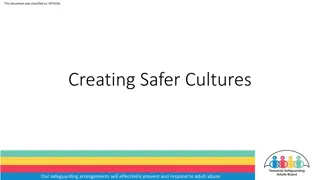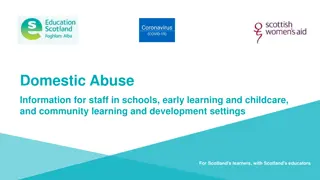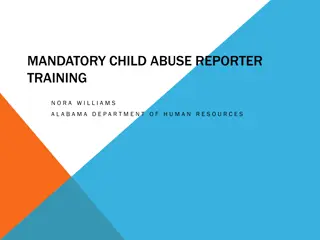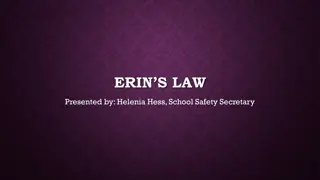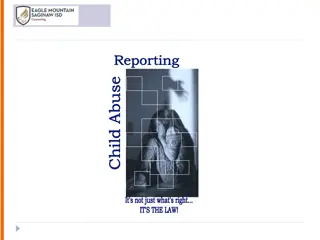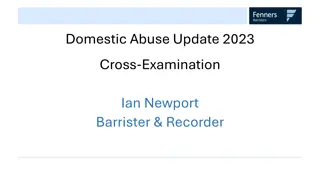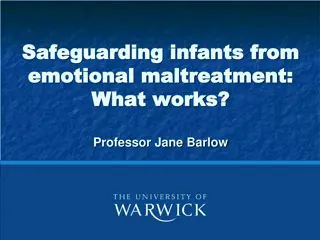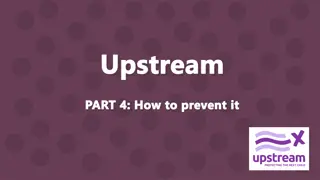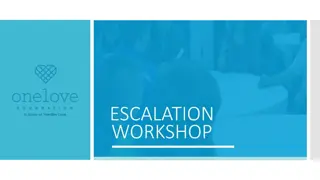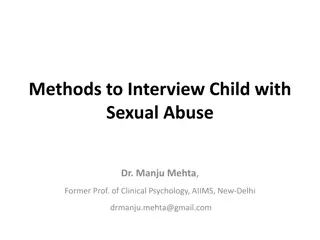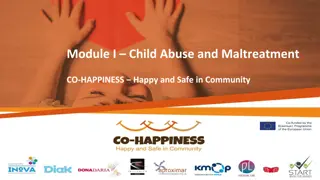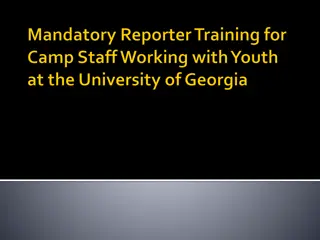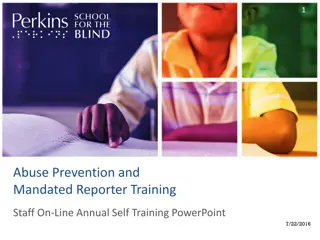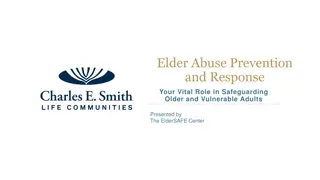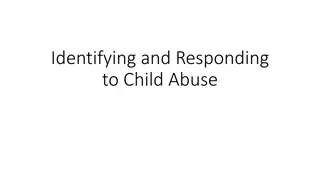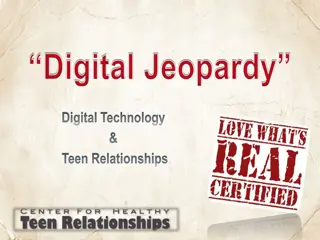Understanding Emotional Abuse: Signs, Effects, and How to Respond
Explore the intricacies of emotional abuse through the eyes of Dr. Katia Reinert, Associate Director of GCHM. Delve into the techniques used by emotional abusers, self-assessment for identifying abuse, effects of abuse, and guidance on how the Christian community can help. Discover the challenges of recognizing emotional abuse, the characteristics of abusers, and resources available for survivors. Gain insights into both male and female abusers' behaviors and the importance of seeking help and making positive changes in relationships.
Download Presentation

Please find below an Image/Link to download the presentation.
The content on the website is provided AS IS for your information and personal use only. It may not be sold, licensed, or shared on other websites without obtaining consent from the author. Download presentation by click this link. If you encounter any issues during the download, it is possible that the publisher has removed the file from their server.
E N D
Presentation Transcript
Emotional Abuse: WHAT WE CAN DO BY DR KATIA REINERT | GCHM ASSOCIATE DIRECTOR
QUESTIONS TO DISCUSS What techniques do emotional abusers use through their words, indifference, actions? What is a self-assessment for emotional abuse? What are the effects of emotional abuse? How should the Christian respond to someone being abused?
What if you are the one being emotionally abusive toward someone you love? Are you willing to recognize and change your behavior? What if you are the survivor? Are you willing to seek help? Do you know where to turn to? What are helpful resources for emotionally abused survivors?
WHY IS EMOTIONAL ABUSE DIFFICULT TO RECOGNIZE? Emotional abuse may be hard to recognize because it can be subtle, and because abusers often blame their victims.
THE PERSONALITY OF AN ABUSER Abusers typically want to control and dominate. They use verbal abuse to accomplish this. They are self- centered, impatient, unreasonable, insensitive, unforgiving, and they lack empathy and are often jealous, suspicious, and withholding.
CHARACTERISTICS OF MALE ABUSERS The Demand Man. Very entitled, easily enraged and extremely critical, often overvaluing his household contributions. Mr. Right. Sees his own perspective as the ultimate authority and doesn t value his spouse s feelings. The Water Torturer. Manages to verbally assault his spouse without shouting or raising his voice.
CHARACTERISTICS OF FEMALE ABUSERS She was verbally abused as a child, witnessed it in her own family, or was verbally abused by a previous partner. She has low self-esteem. She has an intense temper, triggered by minor frustrations and arguments.
Her sense of power or control depends on her partner's acquiescence and his performance per her demands. She has rigid expectations or fantasies of marriage, partnership, or men, and will not compromise. She projects the blame for all relationship difficulties onto her partner. She wouldn't get angry if only he would be who she wants him to be.
Abusers are extremely possessive and jealous. They experience an intense desire to control their mates. Abusers often have superficial relationships with other people. Her primary, if not exclusive, relationship is with her husband/boyfriend. She may be described as having a dual personality She is either sweet or exceptionally cruel and sharp. She is selfish or generous depending on her mood.
A major characteristic of abusers is their capacity to deceive others. She can be sweet, calm, charming, and convincing. The mate is usually a symbol. The abuser doesn t relate to her partner as a person in his own right, but as a symbol of a significant other. This is especially true when she s angry. She assumes that he is thinking, feeling, or acting like that significant other often her father (or other family member or authority figure).
Research points out that abused people tend to abuse others. So abusive behavior can sometimes come from feelings of fear and shame that may have resulted from abuse they suffered prior to marrying their spouse. This often results in the need to control their shame through subsequent abuse.
WHAT ARE THE TECHNIQUES USED IN EMOTIONAL ABUSE?
1. EMOTIONAL ABUSE THROUGH WORDS The Overbearing Opinion. The person who refuses to consider your opinion and forces you to always accept his or hers. The Person Who is Always Right. The person who must always be right and have the last word whenever a disagreement occurs. The Judge and Jury. The person who incorporates harsh judgments of you, as a person or your behavior, to produce your personal shame and guilt.
The Put-Down Artist. The person who uses comments like Youre crazy! How could anyone think such a stupid thing? to devalue your decisions and feelings. The Stand-Up Comic. The person whose use of sarcasm is meant to dig up past issues, drive home a point of view, or belittle you as an individual. The Great Guilt-Giver. The person who uses unrealistic and undeserved false guilt to control your behavior. The Historian. The person who says you re forgiven but then proceeds to bring up every past issue again and again to shame you into accepting his or her decisions and feelings.
2. EMOTIONAL ABUSE THROUGH ACTIONS The Commander-in-Chief. The person who desires to control every aspect of your life from your thoughts to your actions by rigid, militaristic behavior and expectations. The Screamer. The person who uses screaming, yelling, and name-calling as weapons to control you. The Intimidator. The person who uses intimidation, fear, anger, and inappropriate threats to get his or her way.
The Roller-Coaster. The person whose moods and behavior swing from one extreme to another, removing any sense of safety and consistency from your relationship. The Person Who Plays Favorites. The person who displays favoritism by saying, Why can t you be more like making it clear that you do not measure up to someone else. The Role Reverser. Relational roles become confused and reversed, with the parent taking the role of child, the child assuming the responsibilities of the parent, or the child being put in the role of the emotional spouse.
The Wrath of God. The person who misuses Scripture to get his or her own way and who equates his or her own opinion with that of God. Gaslighting. The person who causes you feel like you are losing your mind or memory is gaslighting.
3. EMOTIONAL ABUSE THROUGH INDIFFERENCE The M.I.A. Parent. A parent physically removes himself or herself from any interaction in your life. The Absent Caregiver. A parent removes himself or herself emotionally from interaction in your life.
3. EMOTIONAL ABUSE THROUGH INDIFFERENCE The M.I.A. Parent. A parent physically removes himself or herself from any interaction in your life. The Absent Caregiver. A parent removes himself or herself emotionally from interaction in your life.
WHAT ARE THE EFFECTS OF EMOTIONAL ABUSE? Staying in an emotionally or verbally abusive relationship can have long-lasting effects on your physical and mental health, leading to chronic pain, depression, or anxiety.
You may also: Question your memory of events: Did that really happen? (Gaslighting) Change your behavior for fear of upsetting your partner or act more aggressive or more passive than you would be otherwise. Feel ashamed or guilty. Feel constantly afraid of upsetting your partner. Feel powerless and hopeless. Feel manipulated, used, and controlled. Feel unwanted.
WHAT IS A SELF-ASSESSMENT FOR EMOTIONAL ABUSE? Take a moment to consider these questions. Your partner might have behaved as though these things were okay, even though it's obvious that they aren't okay.
1. Do you feel that you can't discuss with your partner what is bothering you? 2. Does your partner frequently criticize you, humiliate you, or undermine your self-esteem? 3. Does your partner ridicule you for expressing yourself? 4. Does your partner try to isolate you from friends, family, or groups? 5. Does your partner limit your access to work or material resources?
6. Has your partner ever stolen from you? Or run up debts for you to handle? 7. Does your relationship swing back and forth between a lot of emotional distance (clammed up) and being very close? 8. Do you sometimes feel trapped in the relationship? 9. Has your partner ever thrown away or destroyed things that belonged to you? 10.Are you afraid of your partner?
HOW SHOULD THE CHRISTIAN RESPOND TO A FRIEND WHO IS BEING ABUSED?
GENERAL GUIDELINES FOR DEALING WITH THIS KIND OF SITUATION: Acknowledge her pain and that it is indeed real. Ask gentle questions. Be careful not to lay blame. Do not give your friend marching orders to simply do more of something. Do not try to help her/him all on your own.
Offer to go to any meetings. Do not advise any rash decisions. Check in with your friend. Point your friend to Scripture. Pray.
FINAL QUESTIONS What if you are the emotional (verbal) abuser? Are you someone who has used these techniques to abuse another? If so, are you willing to recognize it and seek professional help to change your behavior? Are willing to seek help from above? What if you are the survivor of emotional abuse? Are you willing to confront the abuser with kindness, but with firmness, and to set healthy boundaries? Are you willing to seek professional help? Are you willing to seek healing and wisdom from God in dealing with this situation?
ELLEN G. WHITES COUNSEL FOR COUPLES IN DYSFUNCTIONAL RELATIONSHIP Adventist Home, p. 107: Let each give love rather than exact it. Cultivate that which is noblest in yourselves, and be quick to recognize the good qualities in each other. The consciousness of being appreciated is a wonderful stimulus and satisfaction. Sympathy and respect encourage the striving after excellence, and love itself increases as it stimulates to nobler aims.
Adventist Home, pp. 111, 112: Without mutual forbearance and love no earthly power can hold you and your spouse in the bonds of Christian unity. Your companionship in the marriage relation should be close and tender, holy and elevated, breathing a spiritual power into your lives, that you may be everything to each other that God's word requires. When you reach the condition that the Lord desires you to reach, you will find heaven below and God in your life.


